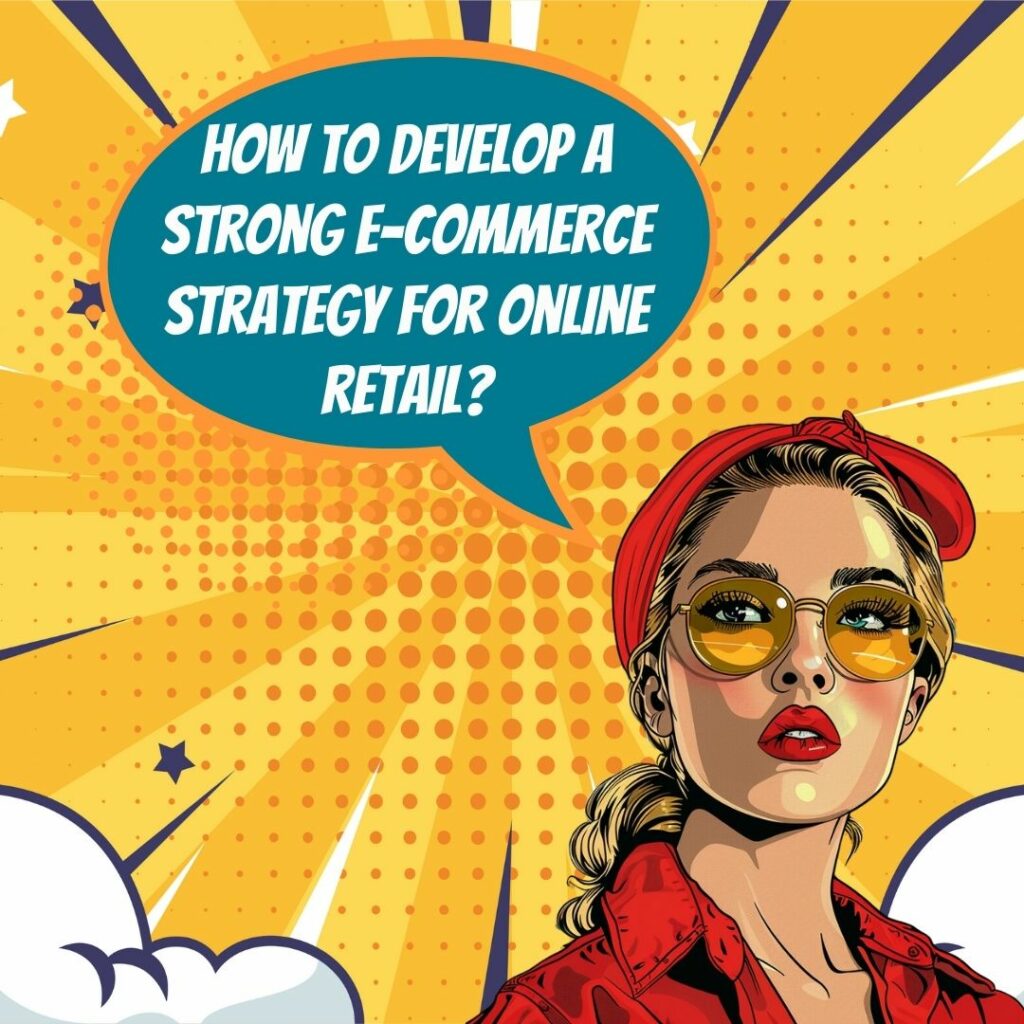Key Takeaways
✅ Optimize Your E-commerce Website for SEO and User Experience: Ensuring that your website is not only visible to customers but also offers them a hassle-free and engaging experience is essential. A focus on SEO drives up organic traffic by making your site more discoverable, while a good user experience keeps customers on the site longer and encourages them to come back. Did you know that a one-second delay in page load time can lead to a 7% loss in conversions?
✅ Leverage Digital Marketing Strategies: Embracing varied and vibrant marketing strategies like compelling video content and email blasts can significantly raise your online visibility and attract more customers. Reports show that customers who purchase through email offers tend to spend more. Could these strategies be the missing piece in your sales puzzle?
✅ Understand Your Target Audience and Simplify Customer Experience: Dive into data to truly get to know your audience - what they like, when they buy, and how they interact with your site. Improved navigation, streamlined checkouts, and chat support can make shopping with you a breeze. Remember, simplifying the customer experience can improve conversion rates by up to 40%.

Introduction
Are you tapping into the full potential of your online store? In the dynamic world of e-commerce, capturing and retaining the attention of your customers could mean the difference between a basketful of sales or a cart of missed opportunities. The stakes are high; with e-commerce retail sales expected to hit $6.54 trillion by 2022, your digital strategy could unlock a veritable treasure trove.
Enhancing online retail and digital sales requires a concoction of tech-savvy enhancements, customer-centric service, and targeted marketing acumen. Are you leveraging every touchpoint to convert clicks into customers? This article is teeming with innovative approaches to not only keep pace with modern trends but to set the benchmark in maximizing revenue, improving ROAS (Return on Ad Spend), and boosting ROI (Return on Investment).
Embark on a journey filled with actionable insights and strategies that will not just light up your dashboard with impressive traffic stats but will translate them into sustainable growth and revenue. Are you ready to revolutionize your online presence and turn your e-commerce site into a sales powerhouse? Let's dive in!
Top Statistics
| Statistic | Insight |
|---|---|
| 20.1% of retail purchases online by 2024: Expected to grow to 23% by 2027. | The uptick in online shopping is steadily becoming the norm, prompting retailers to refine their online presence. |
| Global E-commerce Market: Forecasted to be $6.3 trillion in 2024. | Representing a huge market opportunity, businesses should harness the potential of a global customer base. |
| 91% of users purchase with smartphones: Mobile commerce's share of all retail sales could hit 62% by 2027. | Mobile adaptation is no longer optional, it's crucial for businesses to success in an increasingly on-the-go culture. |
| 34% of shoppers online weekly: Regular activity signifies a strong habit of online shopping. | With such frequent engagement, businesses have numerous opportunities to connect and convert shoppers. |
| E-commerce Penetration in U.S.: Reached 15.9% of total sales in Q1 2024. | Proof that e-commerce is carving out a significant sector of the market; businesses should take note and act accordingly. |
Optimize Your E-commerce Website for SEO and User Experience
When you're selling online, visibility is king. But how do you get your website to pop up first when customers search for what they need? The answer: SEO optimization. Making sure search engines love your website is essential. This means having the right keywords, fast loading times, and a mobile-friendly design. The goal is to grab that organic traffic, keep people on your page (a no to high bounce rates!), and establish credibility. Remember, a happy visitor often becomes a happy customer, so make your site as user-friendly and attractive as possible.
Leverage Social Media and Influencer Marketing
Have you noticed how some products blow up overnight, and everyone is suddenly talking about them? That's the power of social media and influencers at play. Every platform, from Pinterest to Facebook, can be a showcase for your products if used smartly. Influencer partnerships amplify this effect. But don't stop at just posting photos; these platforms now allow people to buy directly from them. That's right, selling where your customers are already hanging out – without them having to leave the app. It's convenient, and convenience sells.
Implement Effective Conversion Strategies
So, you've got customers prowling around your site. How do you make sure they go from "just looking" to "take my money"? Strike at the pain points - offer free shipping, use tempting pop-ups wisely, and when people forget stuff in their carts, remind them with an email. You can also try adding videos to product listings. Why? Because seeing is believing, and a video can showcase your product like no static image ever could. These little touches can turn a maybe into a yes.
Develop a Strong Email Marketing Strategy
Emails - some say they're old school, but in the e-commerce game, they're gold. A solid email marketing strategy is about keeping that conversation with your customers alive. Send out newsletters with deals they can't ignore, celebrate their birthdays, and make them feel special. But it's not just 'send and forget'; measure how these emails perform. Are they being opened, clicked on, and, most importantly, are they leading to sales? That's the kind of data that will refine your approach and boost those numbers.
Enhance Customer Experience with Live Chat and Reviews
Nothing beats a quick reply when you've got a burning question about a product. That's where live chat comes in. It's like having a sales assistant by your side, anytime, anywhere. Plus, customer reviews are pure gold; they're honest, persuasive, and what's more trustworthy than a recommendation from another shopper? Encourage this feedback, learn from it, and let it lift your reputation and sales.
Stay Competitive with Data-Driven Decision Making
In the digital sales arena, the game is always changing. Your ace? Data-driven decisions. Keep a constant eye on how your strategies are performing. Are people responding to your changes, what do the numbers say, and what's the ROI? There's a treasure trove of information in analytics tools to help you understand your customers' behaviors and tastes. Use this insight to adapt and stay one step ahead of the market. After all, in the world of e-commerce, it's adapt or fall behind.
AI Marketing Engineers Recommendation
Recommendation 1: Leverage Data Analytics to Personalize the Customer Journey: It’s not just about having data; it’s about using it to enhance the customer experience. By analyzing browsing behavior, purchase history, and customer interactions, retailers can personalize recommendations and marketing messages. According to a report by Epsilon, 80% of consumers are more likely to make a purchase when brands offer personalized experiences. Utilize analytics tools to segment your audience and tailor your marketing strategies to individual preferences, which can lead to an increase in conversion rates and customer loyalty.
Recommendation 2: Optimize for Mobile Shopping Experience: With the increasing use of smartphones for online shopping, it’s crucial to ensure your e-commerce site is mobile-friendly. Statista reports that in 2021, 54.8% of all retail e-commerce is expected to be generated via m-commerce. Make sure your website has a responsive design, fast loading times, and an easy-to-use interface for mobile users. Additionally, consider the benefits of developing a mobile app if your customer base shows a strong propensity for app engagement.
Recommendation 3: Integrate AI Chatbots for Enhanced Customer Service: In today's fast-paced world, consumers look for quick and efficient customer service. Integrating AI chatbots can help provide real-time assistance to shoppers, answering queries and guiding them through their purchasing decisions. Grand View Research has noted that the global chatbot market is anticipated to reach USD 1.25 billion by 2025, indicating the growing reliance on this technology. Chatbots can improve the shopping experience, reduce cart abandonment rates, and ultimately, boost sales while cutting down on customer service costs.
Relevant Links
Connect, Engage, and Succeed on WeChat
Unleash the Power of Short-Video in China
Rise to the Top of South Korea's E-commerce
Unlock the Evolving Trends of Chinese Shopping Habits
Top SEO Strategies for Germany's Google.de
Conclusion
In the bustling online marketplace, the importance of a strong e-commerce strategy cannot be overstated. As we've explored, optimizing your e-commerce website for both SEO and user experience lays a vital foundation for attracting and retaining customers. Have you ever wondered why one website captures your attention over another? It's often the seamless, engaging user experience coupled with the ease of finding it through a simple search.
Social media and influencer marketing are more than just buzzwords; they are pivotal channels for connecting with audiences where they spend a significant amount of time. By engaging with customers through these platforms and making use of their direct-selling features, online retailers can transform passive scrolling into active buying. Moreover, implementing effective conversion strategies—such as recovering abandoned carts and adding engaging product videos—turns browsing into an interactive journey with your brand. Are you using these tactics to their full potential to boost your digital sales conversions?
A robust email marketing strategy and the enhancement of customer experience with tools like live chat and the integration of customer reviews build a circle of trust and repeat business. Are your communication touchpoints with customers encouraging loyalty and repeat purchases? Lastly, staying nimble with data-driven decision making ensures that e-commerce strategies adapt in real-time, providing a competitive edge in a dynamic online retail landscape. In this digital era, are you letting data lead the way?
Reflect on these strategies and actions; they are not just steps but milestones in carving out a successful niche in the e-commerce world. Remember, it's the intelligent combination of SEO, social media, user experience, analytics, and customer service that will fortify your online retail and digital sales efforts. Are you ready to take these insights and weave them into a formidable strategy for e-commerce success?
FAQs
Question 1: What is e-commerce marketing?
Answer: E-commerce marketing is all about getting the word out about your online store and what you're selling. It's using the internet to let people know about your products, draw them to your store, and keep them coming back for more.
Question 2: Why is a digital marketing strategy important for e-commerce?
Answer: Think of a digital marketing strategy as your online store's game plan. Without it, you might be wandering around in the dark. But with it, you know who you're selling to, how to grab their attention, and how to spend your money wisely to keep your store buzzing.
Question 3: How can affiliate programs increase sales?
Answer: Affiliate programs are like having a bunch of friends who tell people about your products. And the cool part? You only have to pay them if their recommendations lead to a sale. It's a win-win, really – more sales for you, more dough for them.
Question 4: What is the role of Google Shopping in e-commerce marketing?
Answer: Google Shopping is like your products' chance to take the spotlight when people search on Google. Showing up with pictures and all, it's a way to get your stuff noticed and makes shoppers more likely to buy.
Question 5: How does SEO optimize product pages?
Answer: SEO for your product pages is like making sure they're dressed for success at a fancy party—that is, a Google search party. The right keywords, good-looking titles and URLs, unique descriptions, and lots of happy customer reviews help your pages shine and attract more visitors.
Question 6: How can product reviews increase sales?
Answer: Product reviews are like personal recommendations. They tell new customers that others have bought your products and, hey, they're pretty awesome. This trust can turn those window shoppers into buyers.
Question 7: What is the importance of mobile shopping?
Answer: Mobile shopping is huge because everyone's glued to their phones these days! If your online store is easy to use on a phone, people are more likely to shop till they drop, right from their palm.
Question 8: How can email marketing enhance customer experience?
Answer: Email marketing is like sending little love notes to your customers. You can let them know about great deals, new products, and remind them why they loved your store in the first place. It's like keeping the romance alive and the sales ringing.
Question 9: What are the key elements of a successful offer?
Answer: A killer offer isn't just about slashing prices. It's about showing customers what they'll get—cool features, emotional buzz, the nitty-gritty terms, and any sweet extras. Nail this, and they'll be hitting that 'buy' button in no time.
Question 10: How can influencer marketing boost sales?
Answer: Influencer marketing is like getting the cool kids to talk about your products. They tell their followers, who trust them, that what you're selling is worth checking out. That can lead to a spotlight on your brand and, fingers crossed, more cha-ching!
Academic References
- Appel, G., Grewal, L., Hadi, R., & Stephen, A. T. (2020). Setting the Future of Digital and Social Media Marketing Research: Perspectives and Research Propositions. Journal of Interactive Marketing, 51, 91–104. This comprehensive article compiles the insights from authoritative voices on digital and social media marketing, shedding light on the emerging challenges and opportunities in the space, including discussions on how augmented reality and effective content management are changing the game.
- Chaffey, D., & Ellis-Chadwick, F. (2019). Digital Marketing Strategy to Increase Sales Conversion on E-commerce Platforms. In Digital Marketing (pp.124-184). Pearson UK. The research within the book provides a deep-dive into the digital marketing strategies that spell success for e-commerce sales conversion, offering data-backed insights and practical guidance for both business implementers and academic researchers.
- Deleersnyder, B., Geyskens, I., Gielens, K., & Dekimpe, M. G. (2002). How Cannibalistic is the Internet Channel? A Study of the Newspaper Industry in the United Kingdom and The Netherlands. International Journal of Research in Marketing, 19(4), 337–348. Investigating the interplay between physical stores and their online counterparts, this study reveals the positive contribution of store presence to online sales, enhancing understanding of customer interaction across platforms.
- Zhu, L., & Carter, S. (2012). Online Marketing Strategies for Increasing Sales Revenues of Small Retail Businesses. Journal of Small Business and Enterprise Development, 19, 514-527. Drawing from a qualitative case study of small retail business leaders, this paper discusses the online marketing practices that have proven effective in driving sales, covering strategies from social media engagement to content creation and customer follow-ups.
- Kotler, P., & Armstrong, G. (2018). Enhance Online Sales and Customer Retention. In Principles of Marketing (pp. 215–259). Pearson. This educational resource serves up actionable insights for boosting online sales and holding onto customers, with a focus on the critical role played by platform selection, visuals, and customer reviews in the process.












